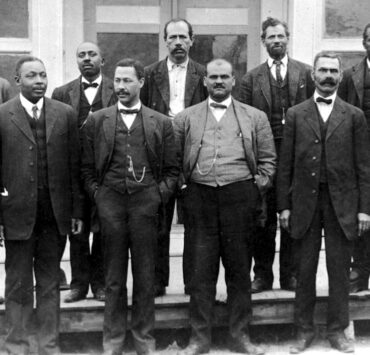Opinion
The Oklahoma Eagle
ILLUSTRATIONS
Adobe Images.
History, when explored fully, without censorship or underlying bias, affords us all the insight and opportunity to commit to a better future. Our children, if denied such an opportunity, because of a fear of feeling unsettled or uncomfortable, will not be prepared to face the world before them and will be destined to repeat our failures.
Amy Cook – the white Memorial High School biology teacher who filed a complaint on Feb. 2, with the Oklahoma State Department of Education’s Accreditation Standards Division, alleging that “Tulsa Public Schools administrators” mandated training that “includes statements that specifically shame white people for past offenses in history” – has discovered a new ally in her pursuit to silence Oklahoma educators… the state agency charged with directing state’s the 547 public school districts.
The Oklahoma State Board of Education voted on July 28 to downgrade the accreditation status of Tulsa Public Schools, concluding that the state’s second largest district violated the concepts of House Bill 1775, a law effected last July that regulates how educators discuss topics of race and gender, as well as restrictions against mandates for diversity training and counseling.
“Accredited With Warning,” TPS’s revised status, reflects a failure to “meet one or more standards” and that a recognized deficiency “detracts from the quality of the school’s educational program,” according to SBOE.
The decisions reached by six of the seven board members (Trent Smith was absent) followed impassioned debates regarding access to evidence, personal interpretations of the H.B. 1775, and the selective nature by which the 33,211 students in Tulsa Public Schools would be uniquely penalized. SBOE concluded the board meeting with one certainty, discussions regarding race and history must not offend a student or educator.
What were the recommendations?
H.B. 1775 prohibits teaching that any individual “bears responsibility for actions committed in the past by other members of the same race or sex.” Brad Clark, the general counsel for the State Department of Education, acknowledged that no evidence provided to the investigation team revealed an explicit violation of H.B. 1775. However, he concluded that a violation did occur based upon his interpretation of available written and audio materials. “It was a close call, but we believe the spirit of that training, or the design of it, was contradictory to H.B. 1775,” Clark noted. The general council’s recommendation was a critical demotion of one level to “Accredited with deficiency.” Board member Brian Bobek, a product of Tulsa Public Schools, sought to levy a harsher action by introducing a motion to downgrade the district’s accreditation one step further, to “Accredited with warning.” As defined by the state’s accreditation standards, Bobek’s motion indicates the district has an issue that “seriously detracts from the quality of the school’s educational program.”
Board Member Opinions
Joy Hofmeister, State Superintendent, Tulsa
ALIGNED WITH THE RECOMMENDATION

Hofmeister’s engagement with board members was narrowly focused on process, guiding colleagues towards a vote on the motion introduced by board member Brian Bobek, that Tulsa Public School’s accreditation is downgraded to “Accredited with warning.”
Hofmeister, like all board members present during the meeting, was provided with the opportunity to challenge, or explore the SBOE’s general counsel Brad Clark’s “interpretation” of the materials reviewed by the investigative team but sought neither clarity nor explanation from Clark. The board member would later characterize the process as an act of “due diligence.” Further, when board member Carlisha Williams Bradley revealed that board members did not have access to all materials related to the complaint, Hofmeister offered no resolution. The state superintendent’s opposition was limited to the enhanced action against Tulsa Public Schools.
Carlisha Williams Bradley, Board Member, Tulsa, Congressional District 1
FACTS NOT FEELINGS

Williams Bradley’s opposition to the motion presented by board member Brian Bobek, to downgraded Tulsa Public School’s accreditation to “Accredited with warning,” was supported by the revelation that board members did not have access to all course materials reviewed by the investigative team and Brad Clark’s concession that his recommendation relied solely upon his interpretation of the materials, not explicit violations of H.B. 1775.
Williams Bradley inquired, of all board members, “How can one teacher’s feelings of guilt or shame detract from the quality of an entire district school education program?” as no qualitative points appeared to be revealed in Clark’s report.
Board members were further challenged, by Williams Bradley, to clearly understand the distinction between bias and inherent racism, as Bobek rhetorically equated both concepts. “If we have a level of understanding implicit bias as board members and inherent racism, then maybe this is way maybe some of this content should be taught in schools,” Williams Bradley added.
Jennifer Monies, Board Member, Oklahoma City, Congressional District 5
I WAS NOT AWARE

Jennifer Monies, after voting in favor of downgrading only Tulsa Public School’s accreditation status due to alleged violations of H.B. 1775, indicated that she was unaware of similar violations by Mustang Public Schools. Monies, although provided with all documents relating to alleged violations, was singularly focused on Tulsa Public Schools’ accreditation downgrade until all votes were cast. In an effort to avoid the appearance of “unfairly targeting TPS,” Monies advanced a motion to vote on the recommendations relating to Mustang Public Schools.
Brian Bobek, Board Member, Oklahoma City, Congressional District 4
THE BOARD IS NOT LIMITED TO ASSESSING DEFICIENCIES

Brian Bobek, not satisfied with Brad Clark’s recommendation, to downgrade TPS’s accreditation to “Accredited with deficiency”, advanced a motion to further lower TPS’s accreditation to “Accredited with warming.” Although Bobek offered no clear justification for his decision after direct inquiries from Carlisha Williams Bradley, most of the board’s members weren’t compelled to challenge him further.
When asked by Williams Bradley to clarify “what about this violation seriously detracts from the quality of the school’s education program?” Bobek concluded that “whoever took it (training), is going to be biased.”
Board members joined Bobek by supporting his motion for the greater downgrade, voting 4-2 in favor of the “Accredited with warming” status.
Sarah Lepak, Board Member, Tulsa
WHISTLE BLOWER PROTECTIONS

Lepak’s engagement with the board, regarding Tulsa Public School’s alleged violation of H.B. 1775, was primarily limited to inquiries regarding process, the protections afforded to the complainant and the channels made available to file complaints. Superintendent Hofmeister clarified that complaints are subject to open records provisions and that the complaint does not fall within the scope of Whistle Blower protections.
What Was The Complaint
PLEASE ACCEPT THE FOLLOWING REPORT about a violation of HB1775 at my school, Memorial High School, Tulsa, Oklahoma. I am a [REDACTED] teacher at Memorial High School and am being told by Tulsa Public Schools administrators that I must complete a mandatory set of 3 compliance courses through Vector Solutions – Vector Training, K-12 Edition. The 2nd compliance course contains a section that includes statements that specifically shame white people for past offenses in history, and state that all are implicitly racially biased by nature.
I have attached pictures from the videos I have been forced to watch this semester. Please let me know if you need more information. I am happy to cooperate with your investigation. I am reporting this straight to your department because, after searching for over an hour, I could not find any resources on Tulsa Public School’s website that direct a person to a process for reporting violations. There are no procedures listed anywhere, which is another violation of HB1775. Thank you for reading and investigating my report. – FEB 2, 2022
H.B. 1775
AN ACT RELATING TO education; prohibiting certain students within certain institutions from being required to engage in certain training or counseling; allowing for voluntary counseling; prohibiting orientation or requirement that presents any form of certain stereotyping or bias; directing promulgation of rules pursuant to certain act and subject to certain approval; prohibiting certain application; prohibiting employees of certain schools from requiring certain concepts to be part of a course; specifying concepts; directing promulgation of rules pursuant to certain act and subject to certain approval; providing for codification; providing
an effective date; and declaring an emergency.











